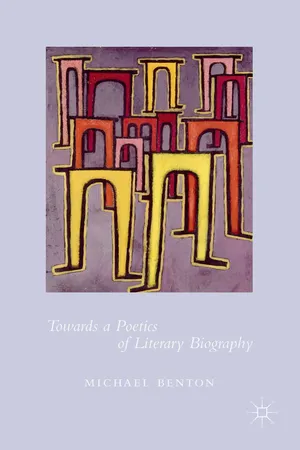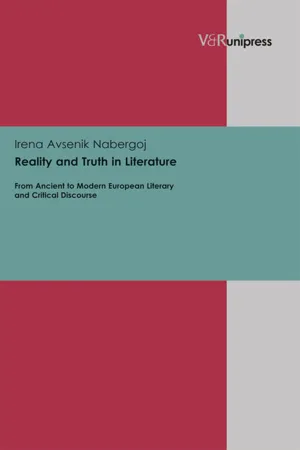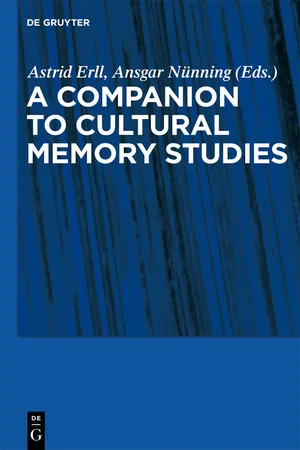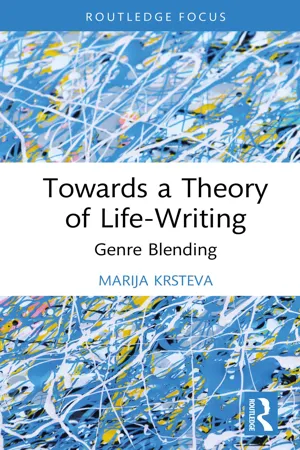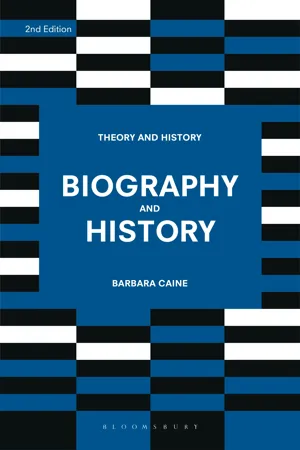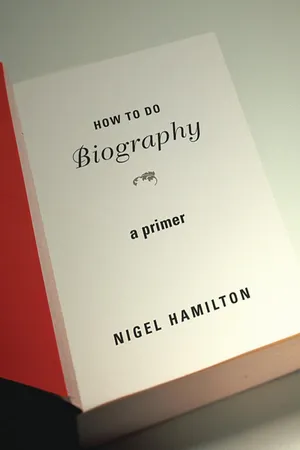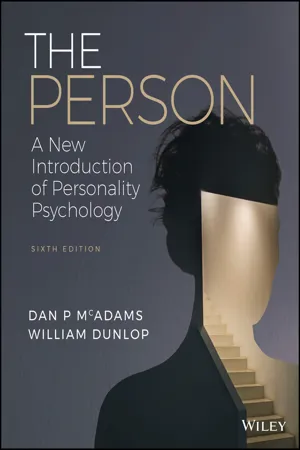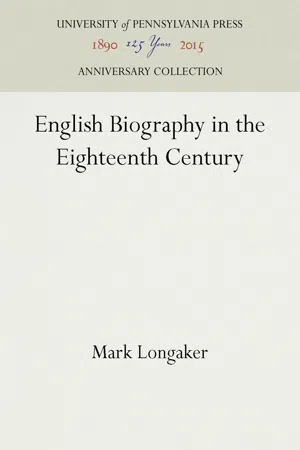Literature
Biography
A biography is a written account of a person's life, typically focusing on their achievements, experiences, and impact on society. It provides a detailed and factual narrative of the individual's life, often including personal anecdotes, historical context, and significant events. Biographies offer insight into the lives of notable figures, allowing readers to gain a deeper understanding of their contributions and legacy.
Written by Perlego with AI-assistance
Related key terms
1 of 5
8 Key excerpts on "Biography"
- eBook - ePub
- Michael Benton(Author)
- 2015(Publication Date)
- Palgrave Macmillan(Publisher)
1 Art and Artifice in BiographyBiography is an ancient literary genre. First of all – chronologically and logically – it is a part of historiography.(R. Wellek & A. Warren, Theory of Literature, 1949)1In the family of literature, Biography seems to be the product of a strange coupling between old-fashioned history and the traditional novel.(Michael Holroyd, ‘What Justifies Biography?’ 2003)2Biography is quite properly regarded as grounded in historiography. Its business, so convention has it, deals with documented, verifiable facts and with deploying them to reconstruct a life story in clear, unembellished language. But historiography, like history itself, moves on and carries Biography with it. Modern biographers continue to engage with well-worn arguments about the nature of their genre but, more significantly, following the historians’ lead, they have become increasingly alert to the uncertain status of the stories they tell, the instabilities of ‘facts’ as their raw material, and the idiosyncrasies of the language they use. Biographical writing throws such issues into relief more prominently than writing fiction or writing history not least because its poetics – the generic principles that govern its form and procedures – shares features with both. In what follows, the opening section revisits the basic issues of genre as the context for the subsequent discussion of the three fundamental components of biographical writing: story-making, the role of facts, and the language in which it is cast. This discussion leads to a brief conclusion about the relationship between ‘Lives’ and lives, finding that Biography is uniquely well placed to elucidate for readers the primacy of the narrative imagination both in life and literature.Genre: art, craft or design?There is no consensus about how to describe ‘Biography’ as a genre. All three terms appear in the titles of books and articles, though the first occurs most often.3 But, if it is an art, what qualities are being recognised in a form of literature that appears to be based on verifiable documentary data requiring craft-like skills to put it together? Do biographers practise an art, or a craft, or ‘something betwixt and between’ – whatever Virginia Woolf meant by the phrase?4 Do we become aware, during reading, of the biographer’s conscious artifice, of workmanship that shows ingenuity and expediency in making things fit into a manageable ‘Life’? Biography sits uncomfortably between history and literature primarily because of its hybrid nature that Michael Holroyd draws to our attention. Yet even in a book he subtitles, ‘The Craft of Biography and AutoBiography’, he vacillates between terms.5 At one level, this is unimportant, indicating that to argue the toss about labels is a fruitless exercise. Yet an unstable label is a telling sign that there is uncertainty at the heart of biographical practice; that Biography feels uncomfortable in trying to accommodate its factual data, through the application of its craft-like skills, while designing an appropriate shape and development for the story of a literary life. The fact is that some biographers select with an eye to promoting a conscious aesthetic in form and language, invested with the imaginative empathy that we associate with art (Claire Tomalin, Charles Dickens:. A Life, 2011); while others, writing about the same subject, exhibit the no less necessary abilities and techniques in organising and shaping masses of information into a coherent, comprehensive and intricately detailed whole – the skills we recognise as those of the master of a craft (Michael Slater, Charles Dickens, 2011). Of course, these are emphases not alternatives.6 - eBook - PDF
Reality and Truth in Literature
From Ancient to Modern European Literary and Critical Discourse
- Irena Avsenik Nabergoj(Author)
- 2013(Publication Date)
- V&R Unipress(Publisher)
Life writing is a general term for writing that focuses on an individual life as a subject: “Such writing can be biographical, novelistic, historical, or explicitly self-referential and therefore autobiographical. We understand life narrative as a somewhat narrower term that includes many kinds of self-referential writing, including autoBiography” (Smith and Watson 2001: 3). Running parallel to a natural inclination to discover the truth is the human tendency to search for historical “facts,” and for this reason it is not self-un- derstood that the reader of an autobiographical tale will assiduously and con- sciously differentiate between “aesthetic” and “historical” truth. Writers of au- toBiography must find their own way of harmonizing the two principles. Man than “factual” truth, autobiographers present subjective “truth” (Smith and Watson 2001: 10). - eBook - PDF
A Companion to Cultural Memory Studies
An International and Interdisciplinary Handbook
- Astrid Erll, Ansgar Nünning(Authors)
- 2008(Publication Date)
- De Gruyter(Publisher)
Life-Writing, Cultural Memory, and Literary Studies M AX S AUNDERS “Life-writing” is a contentious term. It covers a wide range of texts and forms. Indeed, its contentiousness arises at least partly because it seems, to some, to cover too many. As one leading British biographer, Hermione Lee, writes, it is sometimes used “when different ways of telling a life-story—memoir, autoBiography, Biography, diary, letters, autobiographical fiction—are being discussed together” (100). This is the main sense in which I shall be using it. Though, as Lee notes, another main usage is “when the distinction between Biography and autoBiography is being de-liberately blurred” (100). Critics sometimes use the term “auto/Biography” to indicate this generic fusion (or, again, as a shorthand for talking of the genres autoBiography and Biography together). The term “autoBiography” was coined as Romanticism took shape towards the end of the eighteenth century. Paradoxically, this is also the period in which the view began to emerge that all writing had an autobiographical dimension. According to this view, which became increasingly consolidated through the nineteenth century, and which is even shared by Postmodernism, the distinction be-tween autoBiography and other forms such as Biography or fiction is thus always already blurred. The two senses distinguished by Lee are then not as distinct as they might have seemed. A memoir of someone else, by virtue of the fact that you are writing about them because they were im-portant in your life, will be part of your autoBiography. That scholars are prepared to spend years of their lives immersing themselves in the biogra-phies of others tells you something about their biographies. To some ex-tent they are writing displaced autobiographies; and that vector of dis-placement is what lends even the most scrupulously factual Biography its admixture of fictionality. - eBook - ePub
Towards a Theory of Life-Writing
Genre Blending
- Marija Krsteva(Author)
- 2022(Publication Date)
- Routledge(Publisher)
As noted above, before beginning his work, the literary biographer sets a clear goal, that of concocting a writer’s biographical story. He becomes the genre’s “puppet master”. He recognizes the commonalities between the genres and how the genre play can masterfully counterfeit important story elements. Yet, he seems to approach his task earnestly and anxiously.In this respect, the task of the biographer is very complex. His success depends on the creative design of the stories.Unlike their counterparts in political and military fields, they sail in uniquely dangerous waters. To one side they face the hard rocks of historical data which they ignore at their peril; to the other, a whirlpool of imaginative literature which, for biographical purposes, is of uncertain depth and relevance.(Benton 2009 :265)The literary biographer has multiple focal strands to deal with: the biographee’s life material, their existing image in the world and the bibliography of previously published biographies. All of these starting points lead to ways that may intersect with or drift apart from the construction of the biofiction. The metafictional self-reflexivity is inevitable in this process.Literary Biography as a postmodern literary structure combines document facts with strong narrative impulse. It is a narrative product that inclines and declines from its historical necessities and its narrative characteristics leaving open the question of biographical ‘truth’. Narrative, in other words is a discourse that may be generated in history or fiction –even in the blending of the two genres – in which the crucial element is the time. Literary biographies comprise life histories that are, by definition, incomplete and open to discussion. This put the authors of the literary Biography in an ambivalent position. They are charged with the responsibility to present and account for the spectrum of the life from cradle to grave, yet equally expected to give point, significance and interest to that life through narrative modes of representation which are often more readily associated with fiction and which, in the biographer’s interpolations and gap-filling, are constantly edging in that direction. In the writing process, the literary biographer is continuously moving between a conception of events that have occurred ‘prior to entextualisation’ and their representation as created by and with the text. - eBook - ePub
- Barbara Caine(Author)
- 2018(Publication Date)
- Bloomsbury Academic(Publisher)
2A History of BiographyIntroductionAny attempt to understand the relationship between history and Biography needs to take into account not only changing ideas about the nature of history as a form of knowledge and understanding but also the changing ways in which Biography has been understood, thought about and written. These changes can be seen in the ways in which lives were presented and, most particularly, in terms of the aspects of individuals’ lives that biographers have either chosen to explore or deemed inappropriate for any kind of discussion. The question of how a life should be understood and depicted is important not only to those who write Biography but also to those who read it. Their views have not always been the same. Thus, while one can see very marked changes in the areas of an individual life that Biography might encompass from the late seventeenth century to the present, changing ideas have sometimes been signalled by an outcry from readers at a Biography that seems to reveal too much or to lack appropriate discretion and decorum in dealing with the private or intimate life of its subject.A notable feature of the history of modern Biography has been the changing treatment of private life evident within it. One can see this not only in the aspects of an individual’s life that are discussed but also, more broadly, in the shifts evident in the very meaning of the word ‘private’ in relation to Biography. The link between Biography and the private realm was emphasised strongly by the poet John Dryden in one of the earliest seventeenth-century discussions of the term ‘Biography’ and what it involved. Whereas history dealt with many people and many public actions, Dryden argued, Biography involved a descent into the ‘minute actions and trivial circumstances’ of an individual life. In history you are conducted into the rooms of state, but in Biography - eBook - PDF
How To Do Biography
A Primer
- Nigel Hamilton(Author)
- 2009(Publication Date)
- Harvard University Press(Publisher)
Not only did written and graphic life-depictions (which had begun in 15,000 b.c. as match-stick men on cave walls) proliferate, but Biography ex-ploded in all the new technologies of the twentieth cen-tury: in celluloid, on the airwaves, on TV, and ultimately on the Internet—where blogging became the autobiograph-ical rage. Learning more about that evolution will not inhibit you in becoming a biographer. Rather, a historical overview will deepen your understanding of Biography’s rich and conflicted past, its 250-year struggle to fulfill Dr. Johnson’s vision of its importance, and will enable you to appreciate the legal, religious, social, and other barriers with which Biography has had to contend, from laws governing defa-mation, obscenity, copyright, and plagiarism, to academic prejudice and the minefield of poststructuralism. The cross-pollination between media, between genres, and between nonfiction and fiction has been immense—generating in-tense debate over the ethics of Biography and issues of trivialization, intrusiveness, copyright, access rights, even nomenclature. Was Thomas Keneally’s book Schindler’s List a novel (for which it was awarded the Whitbread Prize for Fiction) or a Biography? Should James Frey’s A Million Little Pieces have been published as fiction instead of mem-20 getting started oir—as Frey first intended? Is Steven Shainberg’s 2007 film Fur: An Imaginary Portrait of Diane Arbus, starring Nicole Kidman and Robert Downey Jr., a fictive drama seeking to exploit what Virginia Woolf called the “granite” of biogra-phy as the narrative of a real person? Or is it simply a postmodern biopic for sophisticated audiences who appre-ciate erotica? Biography, today, remains, as it has always been, the record and interpretation of real lives—the lives of oth-ers and of ourselves. But the way we record and inter-pret those lives has varied enormously from age to age. - eBook - PDF
The Person
A New Introduction to Personality Psychology
- Dan P. McAdams, William L. Dunlop(Authors)
- 2022(Publication Date)
- Wiley(Publisher)
357 PART IV The Person as Autobiographical Author Stories teach us how to be human. From Tolstoy to Hollywood, the great novelists and filmmakers plumb the depths of human minds and explore the countless ways people relate to other people and to themselves, how we love each other and how we hate, how we move through life and how we build a life from one moment to the next. As they thrill and inspire us, or bring us to tears, stories track human consciousness and behav- ior developing over time. As such, we cannot help but tell stories about our own lives, too, little stories at first, but eventually larger narratives about who we are and how we came to be the people we are becoming. More even than our traits and goals, our stories express how each of us is a unique person, and how we are, at the same time, intricately tied to others and to the specific world in which our story is told. Chapter 12 Life Stories Chapter 13 Narrative, Culture, and the Adult Life Course Chapter 14 Psychological Biography and the Narrative Study of Lives 358 12 Life Stories About 300 years ago, a peculiar new form of literary expression emerged in Western Europe. It was called the novel. In early examples like Daniel Defoe’s Robinson Crusoe, novelists created extended prose narratives that imaginatively depicted the experience of being human – feelings, thoughts, desires, and behaviors – through a sequence of events involving a particular group of persons living in a particular time and place. The power of the novel lay in its ability to explore subjective human experience with extraordinary breadth, depth, and authenticity. By tracking over time how people perform as social actors and what they want and value as motivated agents, the novel expresses how characters change, as well as how they remain the same, over the course of seconds, minutes, days, years, and even decades. - eBook - PDF
- Mark Longaker(Author)
- 2016(Publication Date)
Bi-ography as a distinct and recognized literary genre developed rapidly, even suddenly, not out of the odds and ends and main roots of earlier motives and examples of Life-writing, but out of the spirit of the times. The life and letters of the half cen-tury following the Restoration were the soil out of which mod-ern Biography grew. The eighteenth century Life was as natural a by-product of the interests of the age as was the novel, and in its development the form was constantly nour-ished by the trend of the times. In order to understand the literary spirit of the age which witnessed the early growth of Biography, it is necessary to recognize the important rôle that France played in English affairs. During the half century following the Restoration, the English dependence on French models of art and life was considerable. Never before had the bond between France and England been so pronounced. When Charles II crossed the Channel to ascend the throne, London began to apply it-self to a studied cultivation of things French. The beau monde imitated with success the brilliance of the court life in Paris; the Comedy of Manners had a Gallic ring in its dialogue; and Boileau, La Bruyère, Madame de Sévigné, and the Duc de Saint Simon were far from unknown. The French MODERN CONCEPTION 65 spirit became more than a brilliant veneer on British institu-tions; it had a perceptible influence on the English mind. A brief examination of this French baggage which came over with Charles at the time of the Restoration is decidedly pertinent to the study of the development of the modern con-ception of Biography. In the spirited days of Louis XIV, the French mind was mundane. In past and future, it had no interest; its attention was riveted on the little world of the here and now, and on the actualities of human experience. The vague and imaginative had no appeal. Reality of con-tent and perfection of form were the objectives of literary effort.
Index pages curate the most relevant extracts from our library of academic textbooks. They’ve been created using an in-house natural language model (NLM), each adding context and meaning to key research topics.
